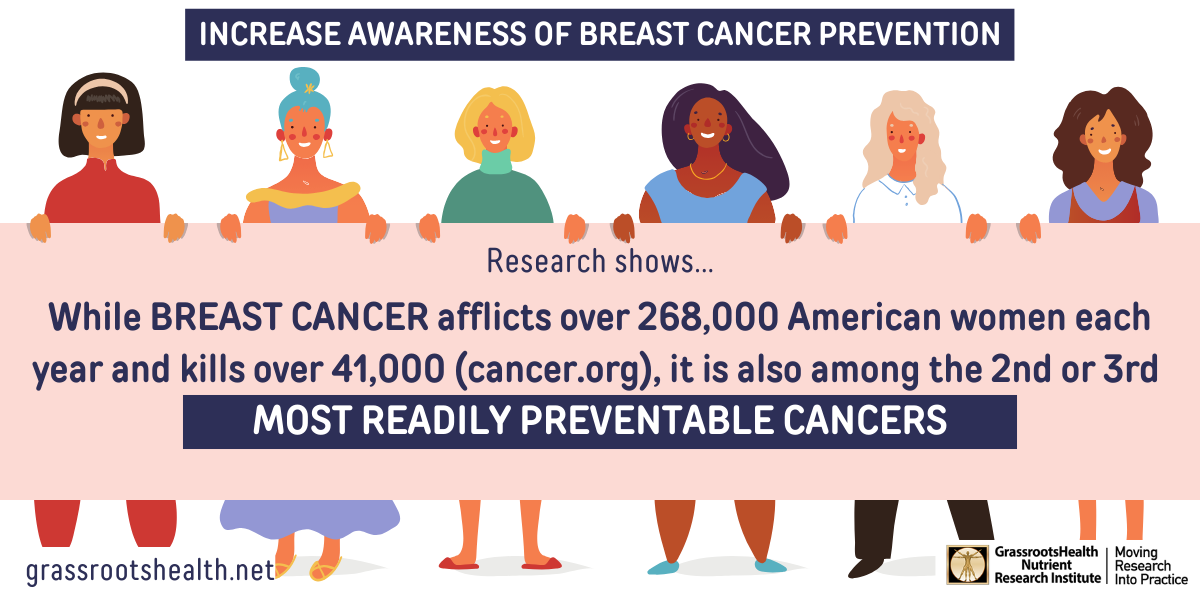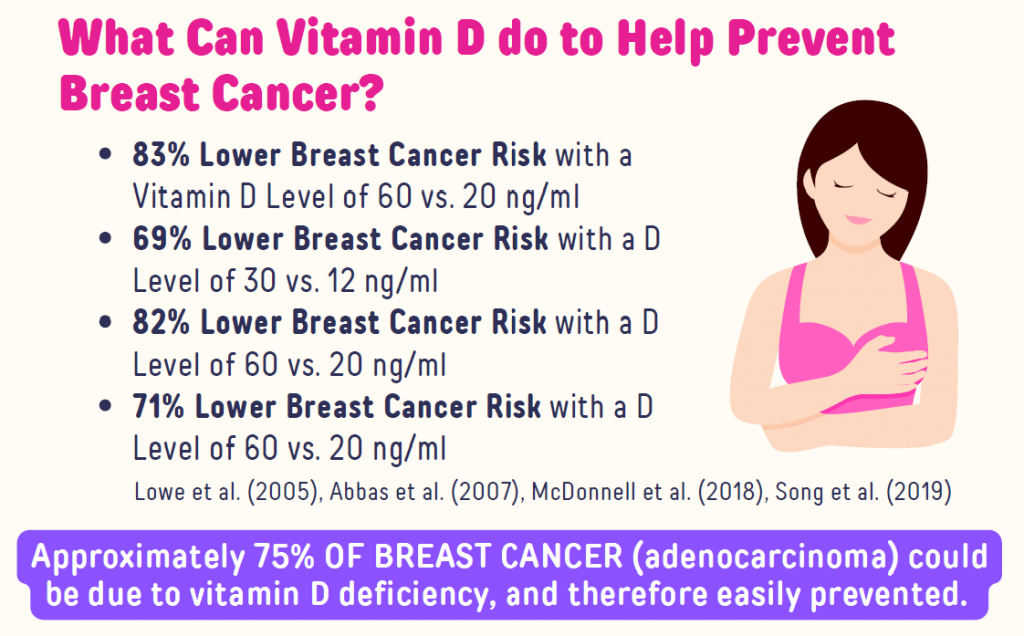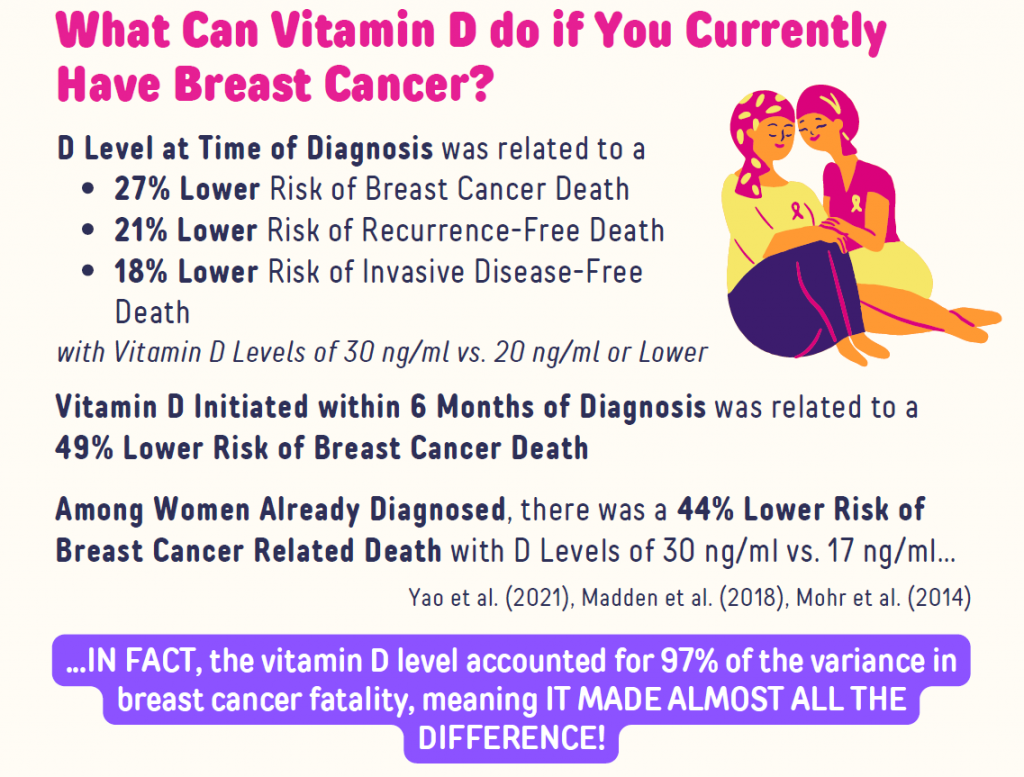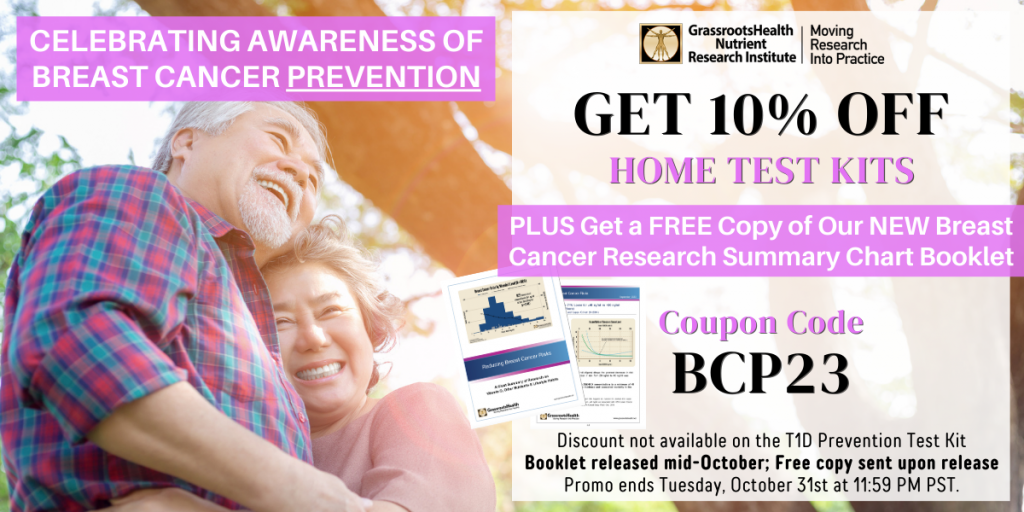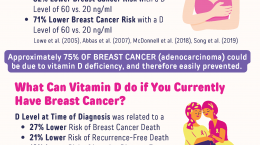Published on October 1, 2023
October is Breast Cancer Awareness Month – Bring awareness to breast cancer PREVENTION all month long by participating in and sharing the research!
Key Points
- Vitamin D plays an important role in breast cancer prevention; an estimated 75% of breast cancer could be due to vitamin D deficiency, and therefore easily prevented with vitamin D alone. Several studies, including those published using GrassrootsHealth cohort data, have demonstrated this relationship between vitamin D status and the risk of breast cancer.
- Research also demonstrates that it is not too late to affect outcomes with vitamin D, even after a breast cancer diagnosis… in fact, vitamin D level among breast cancer patients accounted for 97% of the variance of the relationship between vitamin D level and breast cancer fatality (meaning it made almost all the difference)!
- Other nutrients are also important for reducing risk of breast cancer and improving outcomes among women who get breast cancer, including omega-3s, magnesium, and selenium
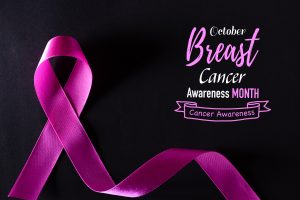 According to breastcancer.org, an estimated 297,790 new cases of invasive breast cancer and 55,720 cases of non-invasive breast cancer are expected to be diagnosed in the United States in the year 2023.
According to breastcancer.org, an estimated 297,790 new cases of invasive breast cancer and 55,720 cases of non-invasive breast cancer are expected to be diagnosed in the United States in the year 2023.
Meanwhile, getting everyone’s vitamin D level up to at least 40-60 ng/ml, assuming an 80% reduced risk of incidence, is a safe and cost-effective intervention that could result in around 283,000 people who would be saved the trauma of breast cancer this year – both the disease itself and the horrific treatment.
RESEARCH SHOWS BREAST CANCER IS AMONG THE MOST PREVENTABLE CANCERS
Getting enough vitamin D, omega-3s, magnesium, selenium, and other nutrients can help reduce the risk of breast cancer and improve breast cancer outcomes.
With October focused on breast cancer awareness, GrassrootsHealth continues to educate about the importance of breast cancer prevention and healing with vitamin D (a topic at the roots of why GrassrootsHealth was founded) and other important nutrients. During this month, we are offering everyone
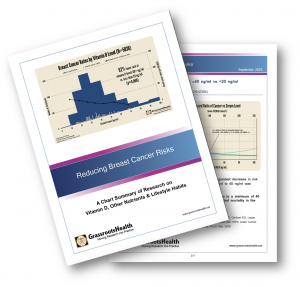 10% OFF HOME BLOOD SPOT TEST KITS
10% OFF HOME BLOOD SPOT TEST KITS
PLUS Get a FREE Copy of Our NEW Breast Cancer Research Summary Chart eBooklet
(to be released mid-October, Free copy sent upon release)
with code BCP23
Hurry! This offer is available now until Tuesday, October 31st, 2023 at 11.59PM PST. Discount not available on T1D Prevention Test Kits.*
GET YOUR TEST KIT AND RESERVE YOUR FREE eBOOKLET NOW!
Please support this educational effort by donating to GrassrootsHealth today!
THE POWER OF KNOWLEDGE – What could knowing your vitamin D level do for your breast cancer risk and survival?
There have been many studies demonstrating a lower risk of breast cancer diagnosis and death when women raise their vitamin D levels. The similar findings between all these studies emphasizes the importance of improving vitamin D status for reducing the risk of breast cancer and increasing chances of survival with diagnosis. Below are some of the key published findings on the topic of breast cancer and vitamin D for reducing the risk of breast cancer and improving breast cancer outcomes.
Vitamin D and Breast Cancer Prevention
Vitamin D plays an important role in breast cancer prevention; an estimated 75% of breast cancer (adenocarcinoma) could be due to vitamin D deficiency, and therefore, easily prevented with vitamin D alone. Several studies, including those published using GrassrootsHealth cohort data, have demonstrated the relationship between vitamin D status and the risk of breast cancer.
- Lowe et al. (2005) found an 83% Lower Breast Cancer Risk with a Vitamin D Level of 60 vs. 20 ng/ml
- Abbas et al. (2007) found a 69% Lower Breast Cancer Risk with Vitamin D Level of 30 vs. 12 ng/ml
- McDonnell et al. (2018) found an 82% Lower Breast Cancer Risk with Vitamin D Level of 60 vs. 20 ng/ml
- Song et al. (2019) found a 71% Lower Breast Cancer Risk with Vitamin D Level of 60 vs. 20 ng/ml
Vitamin D and Outcomes Among Women with Breast Cancer
Research also demonstrates that it is not too late to affect outcomes with vitamin D, even after a breast cancer diagnosis.
- Yao et al. (2021) found a 27% Lower Risk of Breast Cancer Death, a 21% Lower Risk of Recurrence-Free Death, and an 18% Lower Risk of Invasive Disease-Free Death with Vitamin D Levels of 30 ng/ml vs. 20 ng/ml or Lower at the Time of Diagnosis
- Madden et al. (2018) found a 49% Lower Risk of Breast Cancer Death with Vitamin D Supplementation Initiated within 6 Months of Diagnosis
- Mohr et al. (2014) found a 44% Lower Risk of Breast Cancer Related Death with Vitamin D Levels of 30 ng/ml vs.17 ng/ml among Breast Cancer Patients…
…in fact, the vitamin D level accounted for 97% of the variance of the relationship between vitamin D level and breast cancer fatality (meaning it made almost all the difference)!
Omega-3s, Magnesium, Selenium, and Vitamin C are Among Other Nutrients That Can Affect Breast Cancer Risk and Outcomes
Other nutrients are also important for reducing risk of breast cancer and improving outcomes among women who get breast cancer. Studies have shown
- an approximately 40% lower breast cancer risk with higher omega-3 intake (Zheng et al. 2013)
- 40% lower breast cancer risk among women with a higher magnesium intake vs a lower magnesium intake (Huang et al. 2019)
- 58% lower risk of breast cancer death with higher levels of selenium (Demircan et al. 2021)
- 15% lower breast cancer mortality with vitamin C (Harris et al. 2014)
Take Action Today and Measure Your Levels of the Above – While Contributing to Vitamin D & Breast Cancer Research!
Based on the findings presented above, measuring your levels of vitamin D, magnesium, selenium, and omega-3s may help determine if more of these nutrients might be needed to provide the greatest risk reduction for breast cancer and improve outcomes in the case of a breast cancer diagnosis.
Create your custom home blood spot kit with the following measurements to help determine if you are getting enough of the following nutrients shown to benefit your current or future breast health:
- Vitamin D
- Omega-3 Index
- Magnesium PLUS Elements
- Add hsCRP as a marker of inflammation
Test Now; Use BCP23 for 10% OFF
Having and maintaining healthy vitamin D levels and other nutrient levels can help improve your health now and for the future. Enroll and test your levels today, learn what steps to take to improve your status of vitamin D (see below) and other nutrients and blood markers, and take action! By enrolling in the GrassrootsHealth projects, you are not only contributing valuable information to everyone, you are also gaining knowledge about how you could improve your own health through measuring and tracking your nutrient status, and educating yourself on how to improve it.


